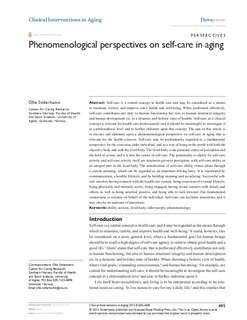| dc.contributor.author | Söderhamn, Olle | |
| dc.date.accessioned | 2013-05-29T12:36:37Z | |
| dc.date.accessioned | 2020-01-13T11:25:17Z | |
| dc.date.available | 2013-05-29T12:36:37Z | |
| dc.date.available | 2020-01-13T11:25:17Z | |
| dc.date.issued | 2013 | |
| dc.identifier.citation | Söderhamn, O.(2013).Phenomenological perspectives on self-care in aging. Clinical Interventions in Aging, 8, 605-608. doi: | nb_NO |
| dc.identifier.issn | 1178-1998 | |
| dc.identifier.uri | http://hdl.handle.net/11250/2635942 | |
| dc.description.abstract | Self-care is a central concept in healthcare and may be considered as the means to maintain, restore and improve health and well-being. When performed effectively, self-care contributes not only to human functioning but also to human structural integrity and human development, ie to a dynamic and holistic state of health. Self-care as a clinical concept is relevant for healthcare professionals, and it should be meaningful to investigate it at a philosophical level and further elaborate it. The aim of this article was to discuss and elaborate a phenomenological perspective on self-care in aging that is relevant for the health sciences. Self-care may preliminary be regarded as a fundamental perspective for the conscious older individual and a way of being-in-the-world with both the objective body and the lived body involved. The lived body as the personal centre of perception and field of action is also the centre of self-care. The potentiality or ability for self-care activity and self-care activity itself are structures given to perception, with self-care ability as an integral part of the lived body. The actualization of self-care ability comes about through a certain meaning, which can be regarded as an important driving force. It is constituted by communication, healthy life style, building meaning and socializing. Successful self-care involves having contacts with the healthcare system, being conscious of a sound lifestyle, being physically and mentally active, being engaged, having social contacts with family and others, and being satisfied and positive and looking forward. One fundamental cornerstone is serenity on behalf of the individual. Self-care can facilitate transitions, and it may also be an outcome of transitions.
Key words: ability, activity, lived body, older people, phenomenology | nb_NO |
| dc.language.iso | eng | nb_NO |
| dc.publisher | Dove Medical Press Ltd. | nb_NO |
| dc.relation.uri | http://www.dovepress.com/articles.php?article_id=13191 | |
| dc.rights | Navngivelse-Ikkekommersiell 4.0 Internasjonal | * |
| dc.rights.uri | http://creativecommons.org/licenses/by-nc/4.0/deed.no | * |
| dc.title | Phenomenological perspectives on self-care in aging | nb_NO |
| dc.type | Journal article | nb_NO |
| dc.date.updated | 2013-05-29T12:36:37Z | |
| dc.description.version | publishedVersion | nb_NO |
| dc.rights.holder | © 2013 The Author | nb_NO |
| dc.subject.nsi | VDP::Medisinske Fag: 700::Helsefag: 800::Helsetjeneste- og helseadministrasjonsforskning: 806 | nb_NO |
| dc.source.pagenumber | 605-608 | nb_NO |
| dc.source.volume | 8 | nb_NO |
| dc.source.journal | Clinical Interventions in Aging | nb_NO |
| dc.identifier.doi | 10.2147/CIA.S45902 | |
| dc.identifier.cristin | 1031320 | |

